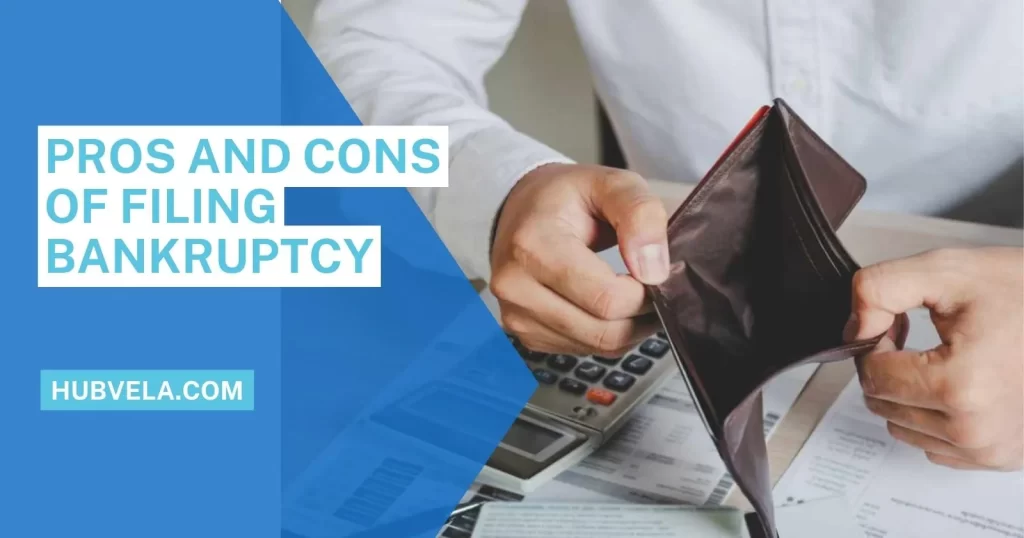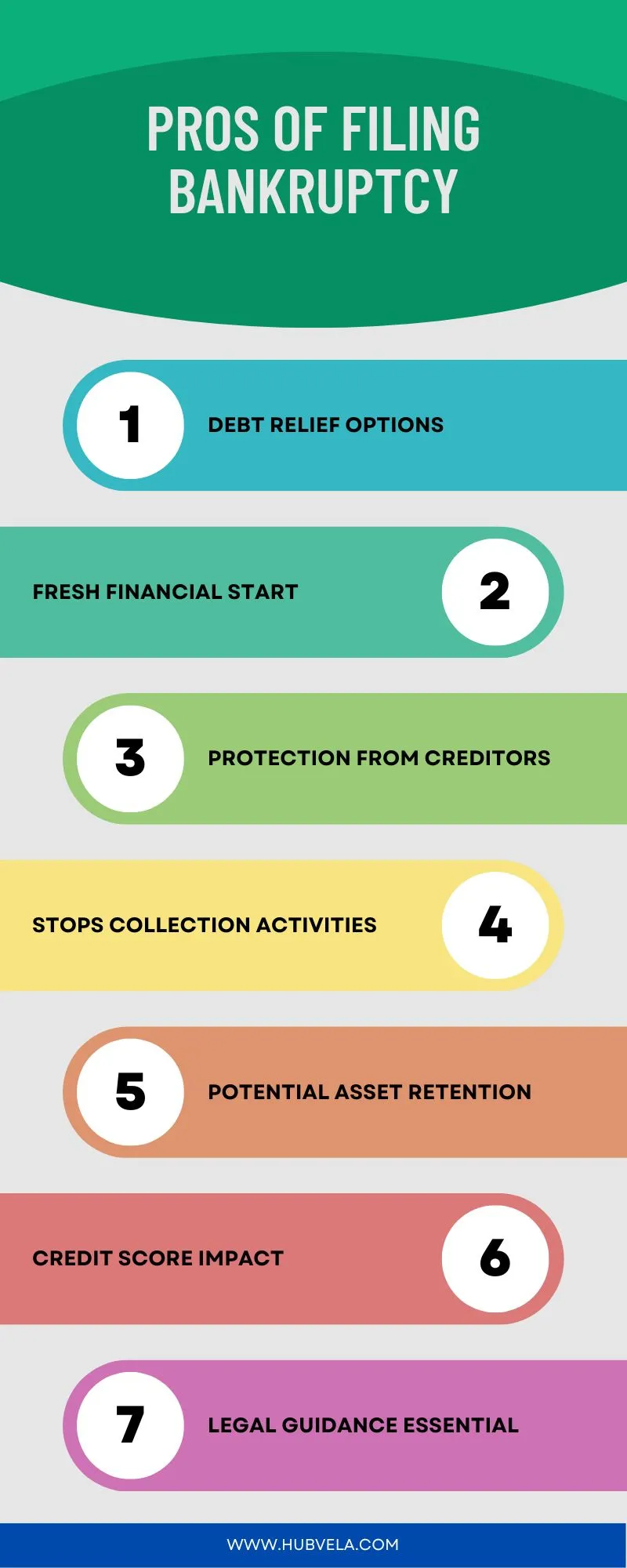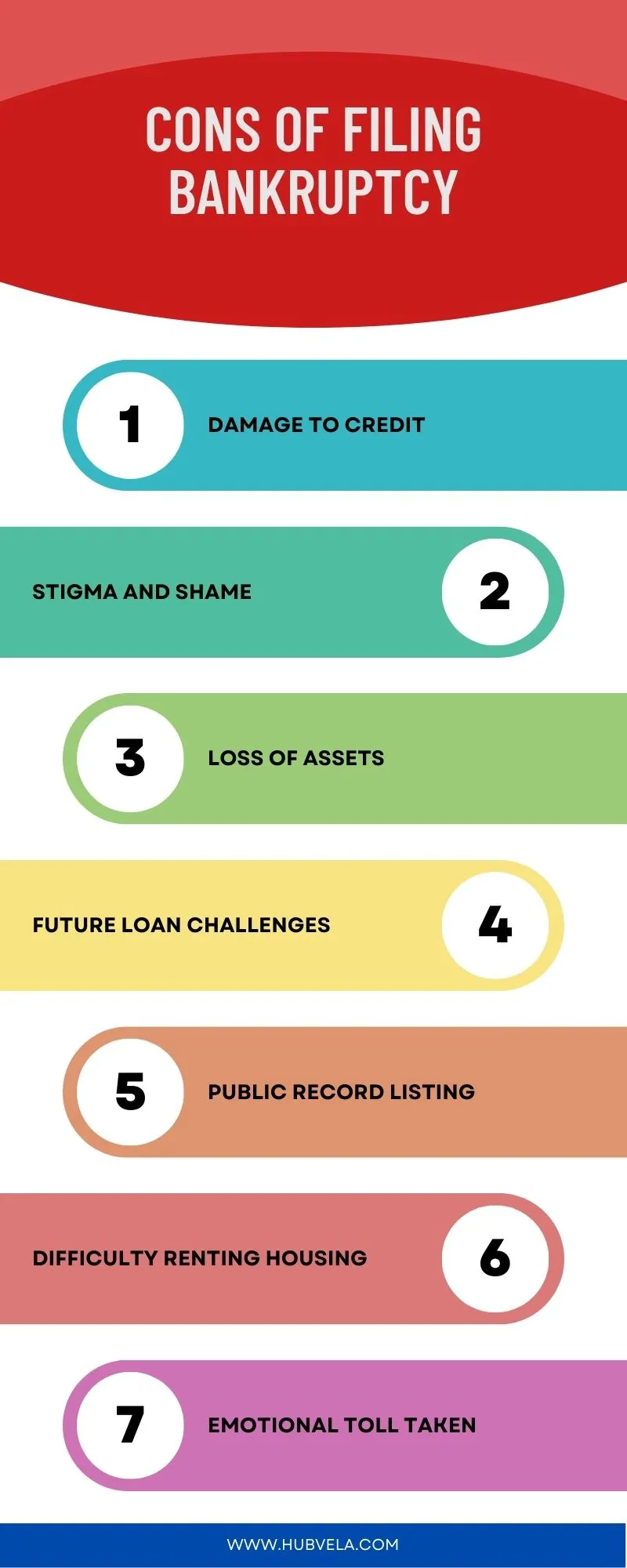Bankruptcy is a legal process that allows individuals or businesses to eliminate or repay their debts under the protection of the federal bankruptcy court.
While it can provide relief for those struggling with overwhelming debt, it is not a decision to be taken lightly. Before considering bankruptcy, it is important to weigh the pros and cons to determine if it is the right choice for your financial situation.
In this article, we will explore the pros and cons of filing bankruptcy. By understanding the advantages and disadvantages of bankruptcy, you can make an informed decision about whether it is the best option for you.

--Advertisement--
Pros Of Filing Bankruptcy
While it may seem like a daunting and negative step to take, filing for bankruptcy can actually have several benefits. We will explore the pros of filing bankruptcy and how it can help individuals and businesses get back on their feet financially.
Whether you are struggling with overwhelming debt or facing financial difficulties due to unforeseen circumstances, understanding the advantages of bankruptcy can help you make an informed decision about your financial future. So, let’s dive in and explore the benefits of filing bankruptcy.

1. Debt Relief Options
Considering bankruptcy as a debt relief option can provide a fresh start for individuals overwhelmed by financial burdens. One of the main advantages is that it can help eliminate or reduce unmanageable debts, giving you a chance to regain control of your finances.
Bankruptcy can also put a stop to creditor harassment, lawsuits, and wage garnishments, providing you with much-needed relief and peace of mind.
By filing for bankruptcy, you may be able to keep certain assets while getting rid of most of your debts. This can offer a sense of stability and a path towards rebuilding your financial future.
Before making a decision, it’s crucial to consult with a bankruptcy attorney to understand your options thoroughly.
2. Fresh Financial Start
When seeking a fresh financial start by filing bankruptcy, you can find relief from overwhelming debts and gain the opportunity to rebuild your financial stability.
By filing for bankruptcy, you can discharge or restructure your debts, allowing you to start anew without the burden of unmanageable financial obligations.
This process can provide you with a clean slate to work towards a healthier financial future. Bankruptcy can help you establish a more structured approach to managing your finances, enabling you to learn from past mistakes and make better decisions moving forward.
Embracing this fresh start can bring a sense of relief and empowerment as you take proactive steps toward improving your financial well-being.
3. Protection From Creditors
Seeking protection from creditors is a key advantage of filing for bankruptcy. When you file for bankruptcy, an automatic stay is put into place, halting creditors from taking any collection actions against you.
This means no more harassing phone calls, letters, or legal actions to collect on debts. The automatic stay provides you with immediate relief and breathing room to assess your financial situation without the constant pressure from creditors.
Bankruptcy can help you discharge or restructure your debts, providing a structured way to repay what you owe or potentially eliminate certain debts altogether.
4. Stops Collection Activities
Stalling collection activities is a significant advantage of filing for bankruptcy. When you file for bankruptcy, an automatic stay is put into effect. This stay halts creditors from pursuing collection actions against you.
It means no more harassing phone calls, letters, or legal threats demanding payment. The automatic stay provides you with immediate relief and breathing space to assess your financial situation without the constant pressure from creditors.
This halt in collection activities can give you the time needed to work with the bankruptcy court to create a plan for managing your debts. By stopping collection efforts, bankruptcy allows you to focus on restructuring your finances and moving towards a fresh start.
5. Potential Asset Retention
One of the key advantages of filing for bankruptcy is the potential for you to retain certain assets. When you file for bankruptcy, there are exemptions in place that may allow you to keep essential assets such as your home, car, and personal belongings.
These exemptions vary depending on the type of bankruptcy you file for and the laws in your state. By utilizing these exemptions, you can protect important assets from being liquidated to pay off debts.
This asset retention can provide you with a sense of stability during a financially challenging time, ensuring that you have the necessary resources to rebuild your financial foundation once the bankruptcy process is complete.
6. Credit Score Impact
Filing for bankruptcy can have a positive impact on your credit score despite the initial dip. While bankruptcy does cause a temporary decrease in your credit score, it also provides a fresh start.
By discharging your debts through bankruptcy, you can start rebuilding your credit from a clean slate. This means that you can focus on managing your finances more responsibly without the burden of overwhelming debt affecting your credit score.
As time passes post-bankruptcy, your credit score can gradually improve as you demonstrate better financial habits. Filing for bankruptcy can pave the way for a healthier credit score in the long run, offering you a chance to rebuild your financial stability.
7. Legal Guidance Essential
When considering the process of filing for bankruptcy, seeking legal guidance is essential to navigate the complexities of the system effectively.
A bankruptcy attorney can provide valuable expertise in understanding the different types of bankruptcy, such as Chapter 7 and Chapter 13, and help you determine which option aligns best with your financial situation.
Legal professionals can assist in preparing and filing the necessary paperwork, ensuring that all requirements are met to move forward with the bankruptcy process smoothly.
Having a lawyer by your side can offer you protection from creditor harassment and provide representation in court if needed.
Cons Of Filing Bankruptcy
Bankruptcy can be a complex and impactful financial decision, and it’s important to carefully consider both its advantages and disadvantages before proceeding.
While bankruptcy can offer a fresh start for individuals and businesses facing overwhelming debt, it also comes with significant drawbacks that warrant thorough consideration.
We will explore the potential negative consequences of filing for bankruptcy, shedding light on the various aspects that individuals should weigh before making this consequential choice.

1. Damage to Credit
Experiencing a significant decline in your credit score is one of the primary drawbacks of declaring bankruptcy. When you file for bankruptcy, it can stay on your credit report for up to ten years, impacting your ability to qualify for loans, credit cards, or favorable interest rates during that time.
Lenders may view you as high-risk, making it challenging to secure new credit or financing. Even if you’re approved for credit, you may face higher interest rates, stricter terms, and lower credit limits.
Rebuilding your credit after bankruptcy takes time and effort, requiring responsible financial habits and patience. It’s essential to understand the long-term consequences of your creditworthiness before deciding to file for bankruptcy.
2. Stigma and Shame
Declaring bankruptcy often carries with it a sense of stigma and shame that can impact your self-esteem and relationships. It’s common to feel embarrassed or judged by others when your financial struggles become public knowledge.
This stigma may lead to feelings of inadequacy or failure, affecting your confidence and mental well-being. Your relationships with friends, family, and colleagues might also be strained as a result of the stigma associated with bankruptcy.
Some individuals may view bankruptcy as a personal shortcoming rather than a financial necessity, leading to potential social isolation or strained interactions.
Overcoming these feelings of shame can be challenging, but it’s essential to remember that bankruptcy is a legal and valid option for those facing overwhelming debt.
3. Loss of Assets
If you file for bankruptcy, one significant drawback is the potential loss of assets. When you file for bankruptcy, depending on the type of bankruptcy you file, you may be required to liquidate certain assets to repay creditors.
This could mean selling off personal property, investments, or even your home in some cases. Losing assets can have a long-lasting impact on your financial stability and future plans.
The process of asset liquidation can be emotionally challenging, as you may have to part with items of sentimental value. Before filing for bankruptcy, carefully consider the potential loss of assets and explore all other options available to manage your debt.
4. Future Loan Challenges
Considering filing for bankruptcy may lead to future loan challenges, hindering your ability to secure credit for a considerable period. Lenders may view you as a higher-risk borrower due to the bankruptcy on your record.
This could result in higher interest rates on loans or credit cards that you do qualify for. Some lenders may be hesitant to extend credit to you at all, especially shortly after your bankruptcy filing.
Even when you do qualify for loans, the terms and conditions may not be as favorable as they’d be for someone with a clean credit history. It’s important to be prepared for these potential challenges and work diligently to rebuild your credit over time.
5. Public Record Listing
Having a bankruptcy on your record results in a public listing that can negatively impact your financial reputation. Once you file for bankruptcy, it becomes a matter of public record, accessible to anyone who conducts a background check.
This public listing can be seen by potential employers, landlords, lenders, and even acquaintances who may view you differently once they know about your financial history.
The presence of bankruptcy on your record could lead to judgments about your ability to manage money responsibly, potentially affecting your opportunities for loans, jobs, or housing.
It’s essential to consider the long-term consequences of this public disclosure when weighing the decision to file for bankruptcy.
6. Difficulty Renting Housing
Facing difficulty in renting housing is a common challenge for individuals with bankruptcy on their record, impacting their ability to secure suitable accommodation.
Landlords and property management companies often conduct background checks before approving a rental application. A bankruptcy on your record may raise concerns about your financial stability and ability to meet rent payments on time.
This can lead to landlords rejecting your application or requiring a higher security deposit. Even if you find a landlord willing to rent to you, you may encounter higher interest rates or less favorable rental terms.
These challenges can make the process of finding a suitable place to live more arduous and stressful for individuals with a bankruptcy history.
7. Emotional Toll Taken
Experiencing a significant emotional toll is a common consequence of filing for bankruptcy, impacting individuals in various ways. The stress and shame associated with financial failure can lead to feelings of embarrassment, failure, and even depression.
You may find yourself constantly worrying about your financial future, relationships, and the stigma attached to bankruptcy. Sleepless nights and strained relationships with loved ones aren’t uncommon during this challenging time.
The process of navigating bankruptcy proceedings can be overwhelming and emotionally draining. It’s essential to seek support from friends, family, or a therapist to help cope with the emotional distress that often accompanies bankruptcy.
Conclusion on Pros And Cons Of Filing Bankruptcy
In conclusion, filing for bankruptcy can provide relief from overwhelming debt and give you a fresh start financially.
However, it can also have negative consequences such as damaging your credit score and making it harder to secure loans in the future.
It’s important to weigh the pros and cons carefully and consider seeking professional advice before making a decision.


